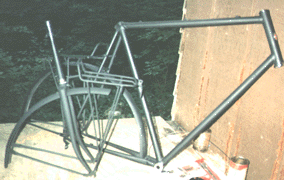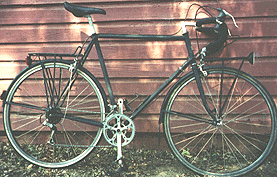New Bike for $100!
No, this isn't a spammer,
just me.
There comes a time
when we look at Old Faithful and say "yuck." It looks like divorce time  and happy bike shop owner time. $$$
and happy bike shop owner time. $$$ 
 My
own old faithful Schwinn has been looking worse and worse, with rust, chipped
paint, and torn-up handlebar foam. I used to keep it in good shape
-- I even waxed my chains -- before I started working 60-hour weeks and
messing with computers on the side. My
own old faithful Schwinn has been looking worse and worse, with rust, chipped
paint, and torn-up handlebar foam. I used to keep it in good shape
-- I even waxed my chains -- before I started working 60-hour weeks and
messing with computers on the side.
To some extent,
a touring bike should look grungy; it's as good as a U-lock. For
that reason, I had painted the bike flat black: not valuable looking, easy
to hide in the woods, and easy to touch up. But I had made my last
two tours without even finding touchup time (I did get a bike shop to overhaul
the bearings and replace bad parts).
The bike shop owner
tried to persuade me that my bike was no longer worth keeping up (his bill
would have bought a decent machine). He gave me a nice catalog full
of beautiful bikes. It was time to let the old bike go. He
asked me if there was anything that my old
bike had that a newer bike wouldn't, and I said, "memories."
You see, that bike
has carried me over 50,000 miles. I remember the day I bought it.
I was out of a job, out of money, out of a bike, and almost out of hope.
But I knew the location of every bike shop with a touring bike for sale
in Northeast Alabama. I couldn't afford a touring bike, and I knew
it, but I also could not afford to drive the van, and I needed a mental
boost. So, I went to the shop selling my favorite (probably because
it was a little more retro than the others), talked a little, rode the
bike less than a block, and handed over my credit card.
Although I had
a van, the bike became my most important transportation. I used it
to see my parents, 75 miles away, and my son, 100 miles away. After
I got a job, I used it to visit Pennsylvania, where I was born, and stopped
by to see the President on the way back (he wasn't home). Two years
later, the bike took me out to Colorado and all up and down their hills.
In the following years, I toured the South, visited New England, traveled
to Ontario, and revisited Pennsylvania.
But another way
to ask the question is, is there anything any newer bike has that this
bike doesn't have?
You see, in spite
of paying just $400 back in 1986, I got a brazed Tange No. 2 frame, designed
by Schwinn and built in a Japanese factory. If I decide I want better
wheels or any other components, I can buy them and install them.
But I can't get a better built frame because this bike feels like heaven,
and I knew it when I rode it that first block.
It's true that
this bike doesn't have the cantilever brakes, the front fork bosses, the
vertical dropouts, and the stretched frame that my other touring bike has,
but I don't miss them. What it does have -- and why my "real" touring
bike has never been on a long trip -- is an incredibly sweet feel.
(By the way, the
second bike was one of the ones I had been looking at before I bought the
Schwinn; five years later, the bike shop owner insisted that I buy it for
about half price.)
For years, I have
been puzzling the difference; the two bikes are almost identical in every
dimension except wheelbase, but the bike with the shorter wheelbase feels
like a long-distance cruiser while the bike with the longer wheelbase feels
sportier. In fact, yesterday I found a simple test that really
discriminates between the two bikes. With one finger on the rump
of the seat, I can push the Schwinn on a level road, and the bike itself
corrects for any gravel or holes. With one finger on the seat of the Nishiki
(also Tange. No. 2), I have to constantly move my hand left and right to
control the bike. Raymond Bridge (Bike Touring, the Sierra Club
Guide) points out the cause: "If a builder wants to increase rake in
order to soften the ride, he or she must decrease the angle of the head
tube at the same time; otherwise the steering would become erratic."
The head tube angles are the same on both bikes; the rake on the Nishiki
is greater. Not that the Nishiki feels erratic; it feels quick and responsive;
the company might have even done it on purpose.
If I had to replace
Old Faithful, the highest praise I could heap on a new bike would be to
say that it feels just as good.
The only hard part
to restoring an old bike is taking the components off. I carry most
of the tools to do so in my tool kit; taking a bike apart is a good way
of testing to see if I have all the necessary tools. The bottom bracket
can be opened in the field (or woods) with a 16 penny nail and some heavier
tool used as a hammer. But at home, I keep a tool for this task which
removes both sides. The headset requires further tools; I just spray
painted over the old one and then had it replaced at a shop (yes, it was
fully indexed).
The bike before re-assembly.

|
Painting
is the cheapest and easiest task. The first time, I let a body shop
paint the bike after I spent two weeks sanding. Then I had to repaint
the bike within a year. This time I used chemicals to strip the paint
and just used sandpaper on a few stubborn spots and on rust. I was
relieved to find very little rust on the bottom of the bike; the damage
was on the top bar. Impressed by the Rust-Oleum ads on TV, I checked
and discovered that the company had flat black, so I chose one can of undercoat
and two cans of paint. To paint the bike and retouch the fenders
and carriers, I hung them from tree limbs, changing the attachment point
with each session. The only thing I had to cover up was the Schwinn
name plate; I just used some electrical tape. There are a few considerations
in spraying the paint: holding the can too close or too far from the
frame can create a poor finish; applying too much or too little paint at one time is
also bad; one has to be careful to get even the smallest crevices while not overpainting
the surrounding areas. By letting the paint dry between sessions and doing some mild sanding, it is possible to remove errors made along the way. Since I was painting flat black, I added no top coat, but a clear top coat will improve the shine and durability of the paint.
Finished at last!

|
In
putting the bike back together, I cleaned everything, replaced everything
that was badly worn, regreased everything that needed grease, and adjusted
everything carefully. Because I am a real klutz, I had to remount
the front gear shifter four times (a different reason each time), and generally
took my time. Hey, I was giving the paint a chance to set!
My new bike now
looks fantastic. I even added to the front fender a black mud flap,
purchased from a Pennsylvania Amish bike shop. Now, I've got to be
careful that no one steals my dream machine.  Fortunately, I can still disguise it with my ugly bags.
Fortunately, I can still disguise it with my ugly bags.

|